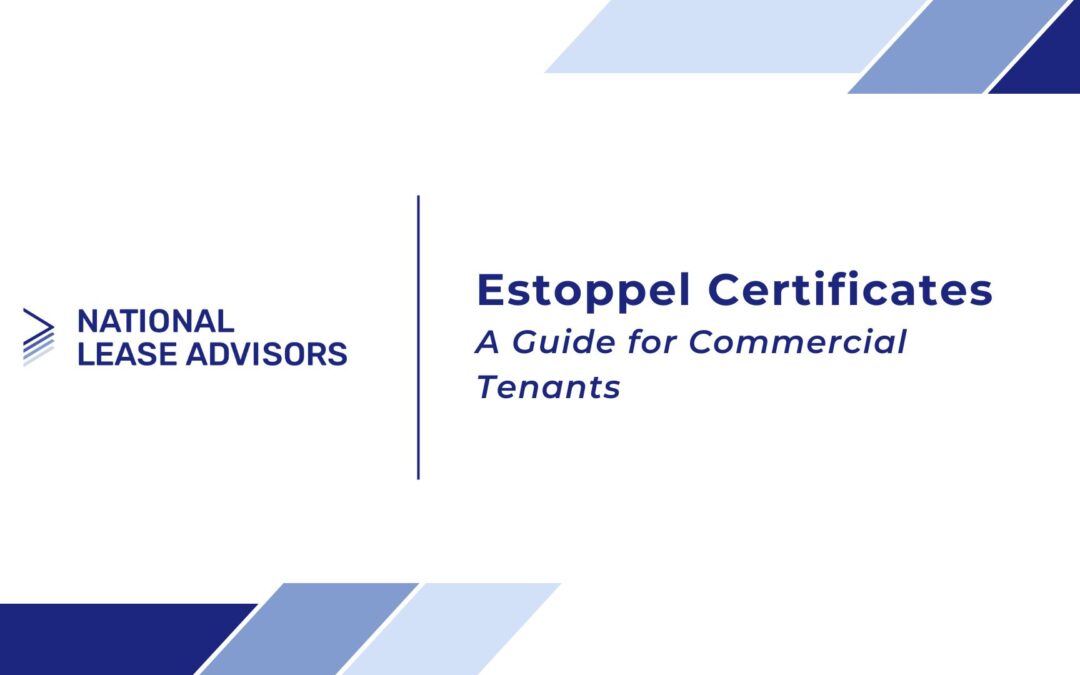As a lease administration company, we receive and review numerous estoppels, or estoppel certificates, on behalf of our clients each year. We often receive questions from our clients about the content of the estoppels, purpose, and rights associated with them. Here is an overview of commercial lease estoppels.
What is a Commercial Lease Estoppel?
A commercial lease estoppel is a document signed by a tenant that verifies the terms and conditions of their lease agreement. It is typically required by a landlord when they are selling the property or seeking financing. The estoppel certificate will state the tenant’s name, the lease start and end dates, the rent amount, any security deposits, and any other relevant information. An estoppel should not modify existing lease terms.
Why Does a Landlord Send a Commercial Lease Estoppel?
There are a few reasons why a landlord might send a commercial lease estoppel to their tenant. First, it can help the landlord to accurately disclose the terms of the lease to a potential buyer or lender. This is important because the buyer or lender will want to know how much rent the tenant is paying and how long the lease term is. Second, the estoppel certificate can help to protect the landlord from any claims by the tenant in the future. If the tenant later tries to claim that they were not aware of a certain term in the lease, the estoppel certificate can be used to prove otherwise.
What Should a Tenant Do When They Receive a Commercial Lease Estoppel?
When a tenant receives a commercial lease estoppel, they should carefully review it to make sure that all of the information is accurate. If there are any errors, the tenant should contact the landlord to correct them. The tenant should also be sure to sign and return the estoppel certificate promptly.
What Opportunities Does a Tenant Have?
Ongoing Issues – The delivery of an estoppel is an appropriate time to bring up any ongoing lease issues between the landlord or tenant. A few examples include outstanding tenant improvement allowances, failure of the landlord to provide maintenance per the lease, the landlord not providing signage per the lease, and an potentially endless list of other things. All issues should be documented in the estoppel.
Renegotiating Lease – An estoppel is usually not an appropriate time to renegotiate the lease. The estoppel is meant to verify terms of the lease and should not be used to modify the lease. Issues that arise may lead to an amendment of the lease, but the estoppel itself does not modify the existing lease. For tenants not accurately tracking lease expirations, such as through lease administration, then they may be surprised by an upcoming lease expiration, in which case the tenant should renegotiate a lease extension with the landlord or evaluate alternative locations.
Do Tenants Have to Sign Estoppel?
The answer is usually yes and will be governed by the terms of the lease. Leases typically state that the tenant has around 10 days to return the estoppel. If the estoppel is not returned it could be a default of the lease or there could be implied acceptance of the estoppel terms. We also recommend that our clients do sign the estoppel even if there are ongoing issues because this is an opportunity to have those issues documented and put any purchaser or lender put notice of the issues.
“Knowledge” versus “Actual Knowledge”
An estoppel certificate will often state the phrase “To Tenant’s knowledge…”, usually in the context of lease defaults or claims against the landlord. We suggest that Tenant’s revise the estoppel to include “To Tenant’s actual knowledge.”
“Knowledge” is a broad term that can refer to both actual knowledge and constructive knowledge. Constructive knowledge is the knowledge that a person should have had about a particular fact or circumstance, even if they did not actually know about it.
“Actual knowledge” is the knowledge that a person actually has about a particular fact or circumstance. It can be proven by direct or circumstantial evidence.
For example, if the landlord is responsible for repairs but only if timely notice is provided by the tenant to the landlord, “knowledge” includes that the Tenant should have known about the defect even though they had no actual knowledge of the defect.
Summary
Estoppel certificates are a standard component of commercial real estate transactions, serving as a snapshot of the lease terms and conditions at a particular moment in time. Though primarily serving the interests of landlords and third parties, they also offer tenants an opportunity to confirm lease details and raise any concerns they might have. By understanding what estoppels are and how they function, tenants can ensure that their interests are well-protected.
—
National Lease Advisors is a leader in the lease administration sector of the commercial real estate industry. The firm focuses on clients with multiple locations both regionally and globally and helps them manage their lease contracts, and provides lease accounting, transaction management, and audit services.

